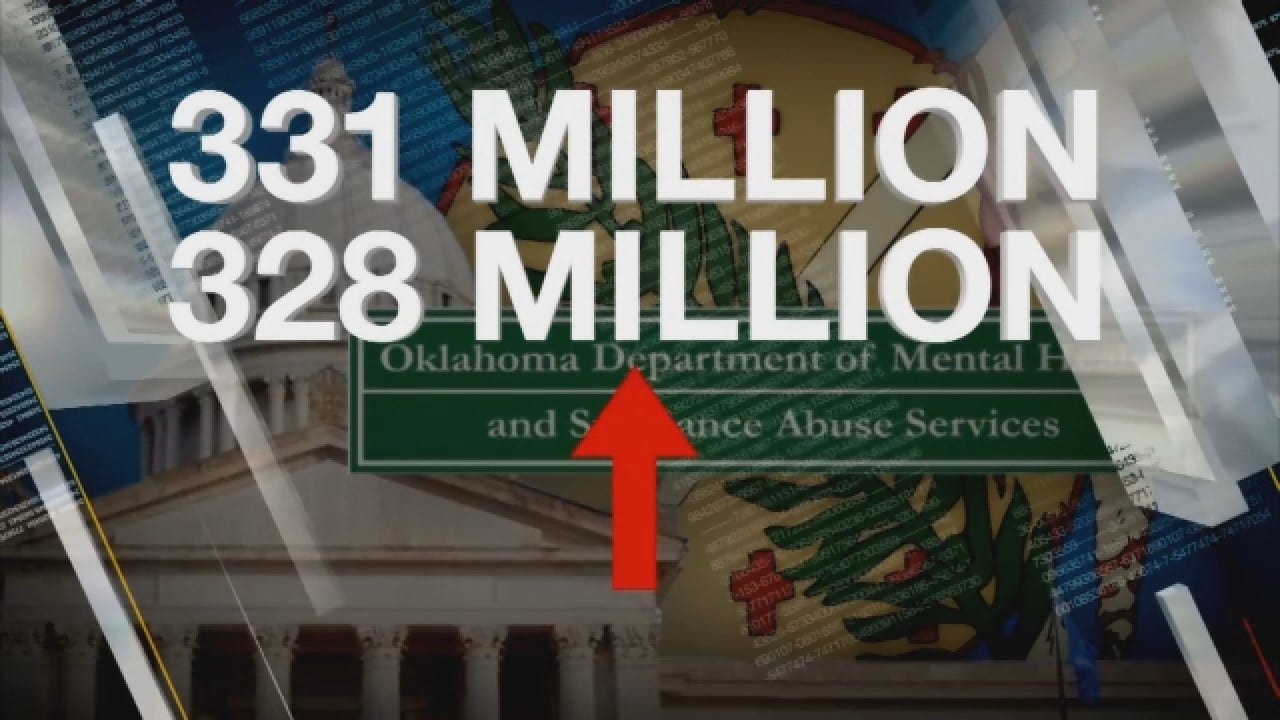Mental Health Funding Crisis Can Mean Life Or Death To Oklahomans
<p>Way too many Oklahomans struggle with mental health, and our state is struggling to find adequate funding for mental health care.</p>Thursday, September 7th 2017, 6:51 pm
At a time when lawmakers are struggling to adequately fund state government, it is particularly challenging for those agencies, such as the Department of Mental Health and Substance Abuse Services (ODMHSAS), that have traditionally been underfunded.
That's the reality, though, for mental health advocates, as they try to convince state leaders that investing in treatment of mental illness will save the state in the long run. There are many Oklahomans who need them to be successful.
"Depression is a very dark place to go," said Francie Moss, in an interview this past spring.
Moss speaks from experience. Her daughter Heather, in a severe bout with depression, tried to commit suicide in 2013.
"When you know you're child is sick, and you're trying so hard to get to the bottom of it, and to get them help," Moss said, her eyes welling up, "it is...it is hell on earth."
Moss carries around with her a detailed log, which she regularly updates, documenting her daughter's bouts with drinking, joblessness, and even homelessness. It reads like a diary of misery, noting one failed treatment effort after another.
"When you don't have a job, you don't have insurance, and you're depending on public services..." Moss's voice trails off, as she shakes her head and her eyes drop to the ground.
It's estimated the roughly a quarter of the state's population -- between 700,000 and 950,000 Oklahomans -- are wrestling with mental illness and addiction at any given time. Of those who must turn to the state for help, there are only enough resources to help one in three.
"Oklahomans can't sustain any more cuts in the area of mental health and substance abuse services," said ODMHSAS Commissioner Terri White.
Lawmakers appropriated $328 million to the department for the current fiscal year, which is actually a slight increase over FY 2017. Still, it's less than the $331 million White says they needed to maintain service levels which had already been decimated by cuts the previous two years.
Tens of thousands of Oklahomans, she says, who have been brave enough to try and get treatment, for things like depression and addiction, are now out of luck.
"These are real medical conditions," Commissioner White emphasizes. "When you leave them untreated, they get worse -- so what we're talking about, honestly, is life and death consequences for people."
No one knows that better than Cathy Costello.
"I hurt every waking minute...every waking minute," said Costello, widow of late Labor Commissioner Mark Costello.
Now more than two years since her husband was stabbed to death in a Braum's parking lot by their mentally ill son, Christian, Costello knows things should have been different. Christian had been diagnosed with schizophrenia and needed intensive treatment, which, even with the Costello's financial means, he didn't get.
"He was in and out of St. Anthony's, the Crisis Center, Griffin, five times in an eleven-week period," Costello lamented, "eight months before he killed his father."
Ironically, it was Christian's crime that finally led to him getting the treatment he needed. The court ordered he be sent to the Oklahoma Forensic Center in Vinita, the largest state-funded inpatient behavioral health facility in Oklahoma.
In an interview earlier this year, Costello said Christian was doing better, to the point that he seemed to understand what he had done, and even gave her an apology.
"And it's interesting how you handle grief," Costello said, "instead of being really happy and excited and relieved, I was extremely angry. It was two days before Thanksgiving and I cried nonstop for the next twelve hours."
Costello says the apology angered her because it proved the system had failed her family.
But the anger fuels her advocacy, and although she is making a run for the office once held by her husband, she remains dedicated to educating Oklahomans about mental illness. She wants everyone to understand that mental illness is a chemical imbalance in the brain, and is just as treatable as any physical ailment.
"People understand heart disease -- Go Red for Women -- but they don't understand mental illness," Costello noted, "so I don't think people fund things they don't understand."
ODMHSAS Commissioner White says there is still a general perception among many in the public that mental illness is something that sufferers should be able to just 'tough out' or 'get over'. She says, on the contrary, mental illness is a disease that requires treatment.
"Just like diabetes, where your pancreas isn't secreting the right amount of insulin, mental illness and addiction are diseases of the brain where the chemicals in the brain aren't working correctly," White explained, "but with services, treatment, and medication, people can lead full and recovered lives."
What's more, Commissioner White says, the cost of treatment is relatively low. compared to the cost of incarceration.
"The actual average cost to provide services is about $2,000 a year per person," White stated, "and the consequences of not providing services are much more expensive and much more devastating."
Francie Moss is hopeful that message will get through to lawmakers.
"There is hope," Moss smiled, "and I'm very blessed because I get to talk about my daughter and she's still alive."
More Like This
September 7th, 2017
March 22nd, 2024
March 14th, 2024
February 9th, 2024
Top Headlines
April 18th, 2024
April 18th, 2024











